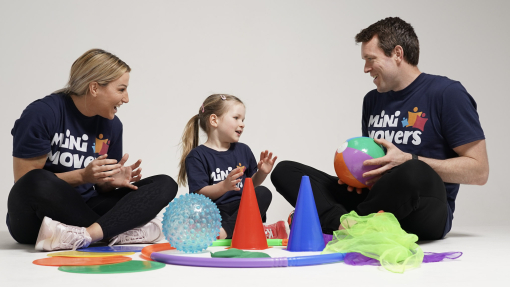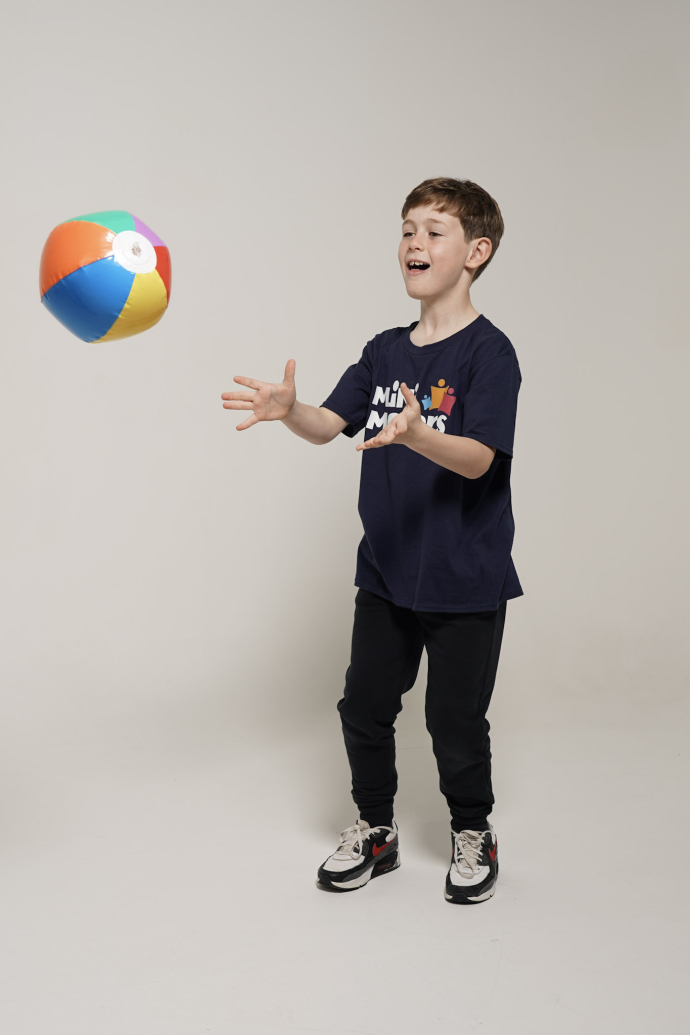With global data showing over 70% of children with developmental delays in their motor skills and data here in Wales finding 88% of 3-year-olds with poor motor skills, many children now enter school lacking essential physical competencies, impacting not only their physical health but also their social and academic skills.
A new app developed by UWTSD’s physical literacy team is being launched on World Children’s Day on 20 November 2024 with this year’s theme “Investing in our future means investing in our children,”
The MiniMovers app, based on decades of research evidence developed by UWTSD’s team of physical literacy experts, is set to make a difference in the lives of families in Wales and beyond by providing parents with tools to support their children’s physical development in the crucial early years.
Research from UWTSD and around the world highlights a concerning trend that young children today are spending increasing amounts of time in sedentary activities, leading to delays in motor skills and associated cognitive and sensory challenges.
With global data showing over 70% of children with developmental delays in their motor skills and data here in Wales finding 88% of 3-year-olds with poor motor skills, many children now enter school lacking essential physical competencies, impacting not only their physical health but also their social and academic skills. With research showing that 90% of children with poor motor skills fail to meet physical activity guidelines, the UWTSD team, in collaboration with Professor Jackie Goodway from the Ohio State University and tech and creative partner Matt Bond from Popex, developed MiniMovers to address this issue, by helping parents foster a foundation of healthy, active living from birth.

Over 30 years of research in motor development shows that there is a need to develop the foundations of movement and learning in early childhood. Dr Nalda Wainwright Associate Professor and co-founder of MiniMovers, said:
“Young children need to have access to high quality play, but critically they also need proper instruction to ensure they develop the skills needed to make healthy life choices. Building on existing global data and over 12 years of research here in Wales we have developed a programme of professional development and training for teachers, pre-school staff, health professionals and coaches. This training – SKIP Cymru was recommended by Welsh Government in 2019 and made a case study in the Well Being of the Future Generation Act support materials, a Journey to a Healthier Wales.
“Whilst this training can address the expertise of staff working in education, health and sport to ensure they can support the development of children’s essential motor skills, the issue starts before children enter the education system. Parents are not aware of the harm that changes in society are causing their children and they certainly do not choose to delay their children’s development.”
In response to this problem the team of physical literacy experts at UWTSD combined with global expertise from Professor Jackie Goodway of The Ohio State University in the USA, worked in partnership with the digital and creative industries to develop MiniMovers.
MiniMovers gives parents information and crucially developmentally appropriate activities that they can do in their own homes and communities to support their children’s physical development and over time reverse the worrying trend of motor developmental delay.
Using a unique algorithm, the app delivers developmentally appropriate activities tailored to each child’s stage, based on established principles of motor development. Available in both English and Welsh, MiniMovers is a uniquely bilingual tool that’s currently being translated into German and French, underscoring UWTSD’s ambition to extend its impact globally. The app’s effectiveness has already been highlighted through a pilot study published earlier this year, and a full-time PhD study at UWTSD is currently examining families’ experiences with the app to further improve and expand its offerings.
Dr Nalda Wainwright continued:
“UWTSD is at the forefront of pioneering solutions that not only address educational needs but respond directly to societal shifts. With MiniMovers, we are harnessing digital innovation to support families in building strong foundations for a healthy, active future.
“The early years is a critical window for laying these foundations and with recent publicity highlighting the social return on investment in sport equating to £4.44 for every £1 spent and if we are to capitalise on this we need to ensure that these essential motor skills are developed in the early years so that all children can capitalise on sport and physical activity opportunities.”
In an era where children’s physical development is increasingly at risk, the MiniMovers app stands as a symbol of UWTSD’s commitment to community well-being and sustainable development. By launching this app on World Children’s Day, UWTSD reinforces its dedication to creating accessible, impactful resources that help build a brighter, healthier future for children in Wales and beyond.


Research Findings:
Good movement (motor competence) in the early years underpins all development.
Motor competence supports physical activity
A big variety of movement skills is needed in the early years to build foundations for later access to a range of sport and activity
Motor competence supports health
Building strong movement foundations reduce the risk of many diseases like heart disease, stroke, type 2 diabetes and many types of cancer.
Motor competence support cognitive development and school readiness
Movement in the early years wires the brain, building the neural connections that are needed for more complex cognitive skills like language, reading and communication
Motor competence supports confidence and self-esteem
Good movement develops increased physical self-perception which increases confidence and self-esteem and supports mental health.
Motor competence associated with weight status
Children who are able to move well choose to move more and have an active lifestyle which supports better skills and more movement, supporting healthier weight
We are facing a global crisis of poor and delayed motor skills
Research with 4- to 7-year-olds in England reported that mastery or proficiency in motor skills does not meet National Curriculum targets with the exception of run, leap, and slide movements.
Less than one fifth of children in England aged 6–9 years have mastered the four key motor skills (run, jump, throw, and catch) identified by the PE National Curriculum
88% of 3 year olds in Wales have poor or delayed motor skills
77% of early years children in USA have delayed motor skills
The consequences of poor motor skills in early childhood is already being seen in low levels of physical activity in children and adolescents, an increase in over weight and obesity in primary aged children and type2 diabetes across the whole of the UK
